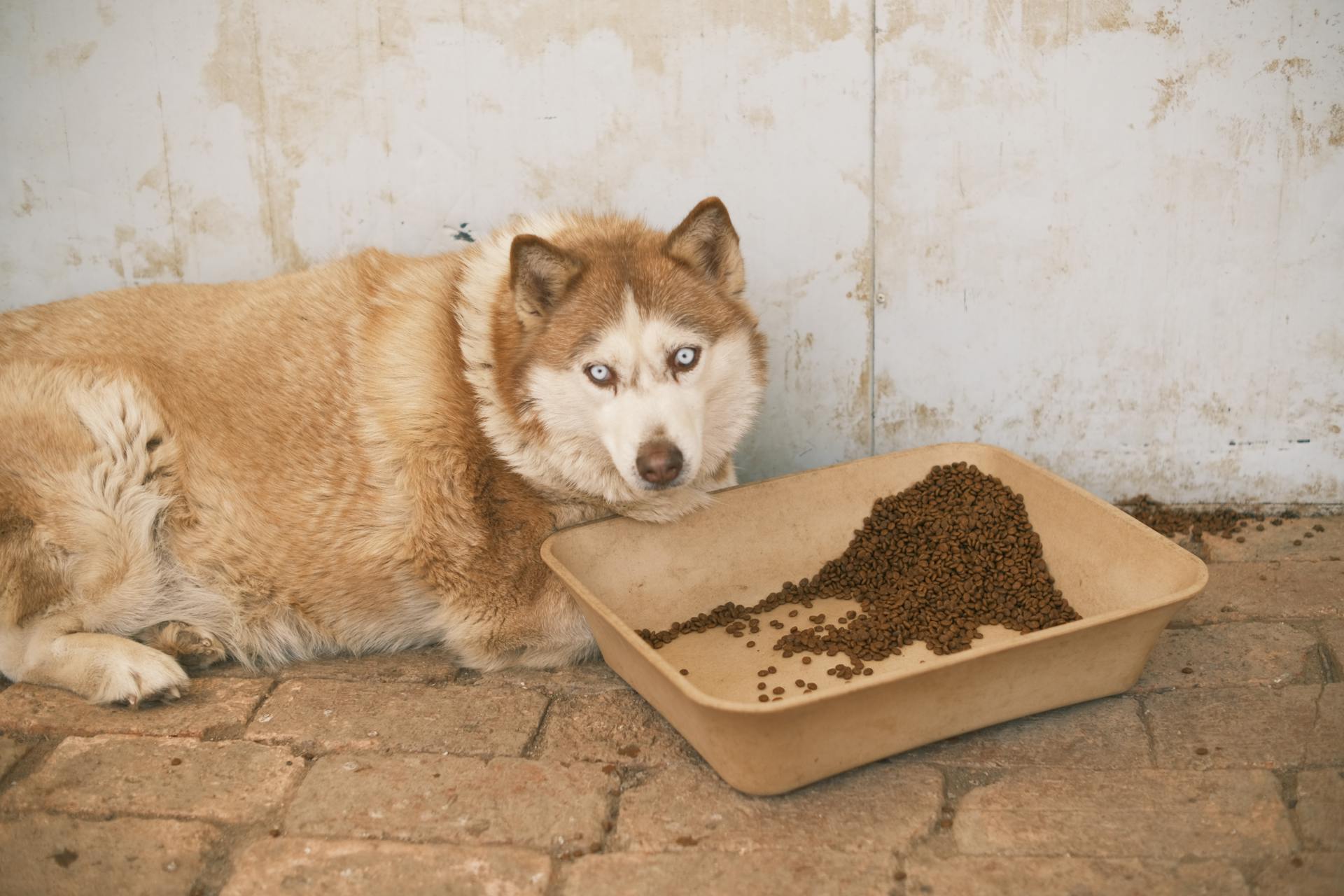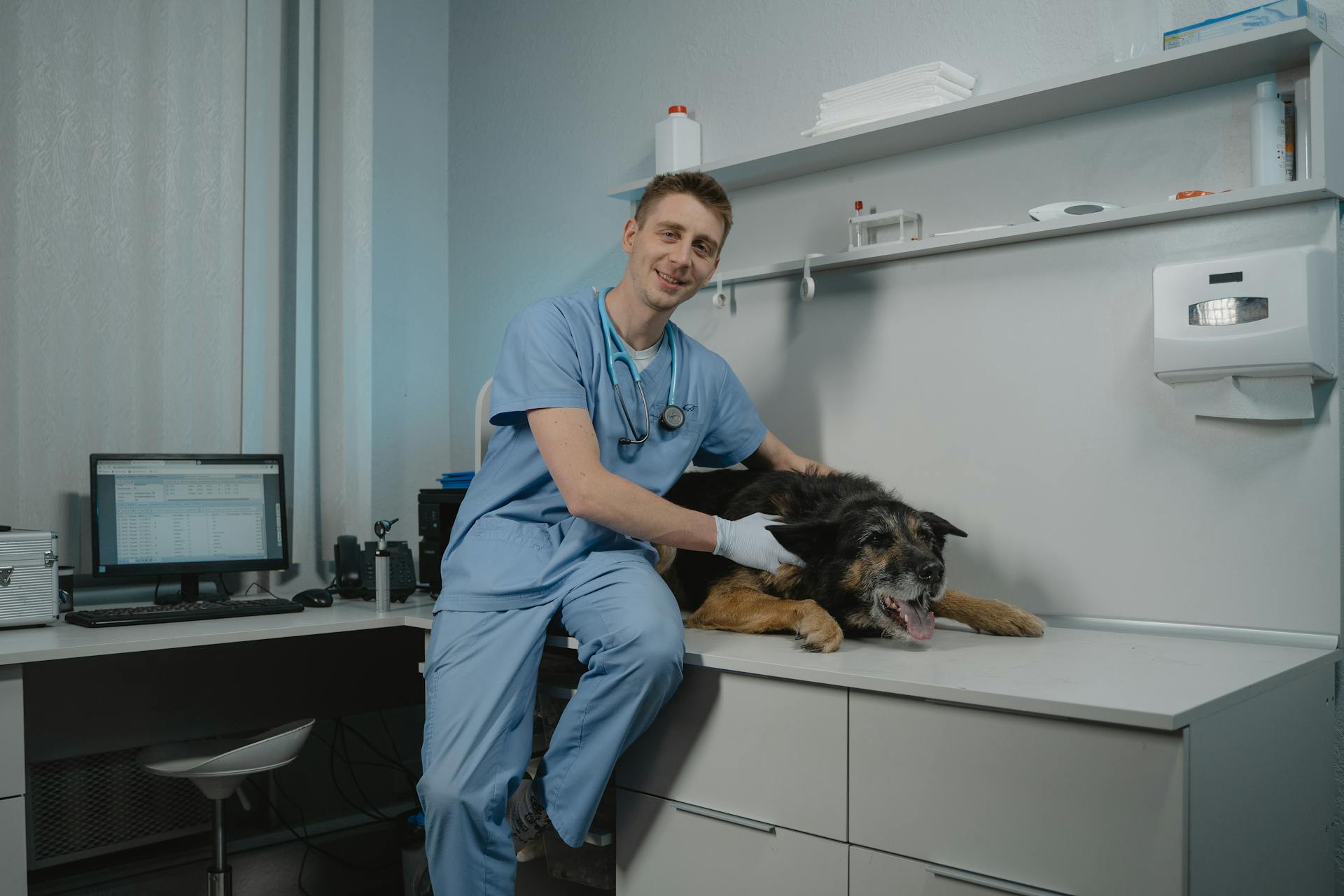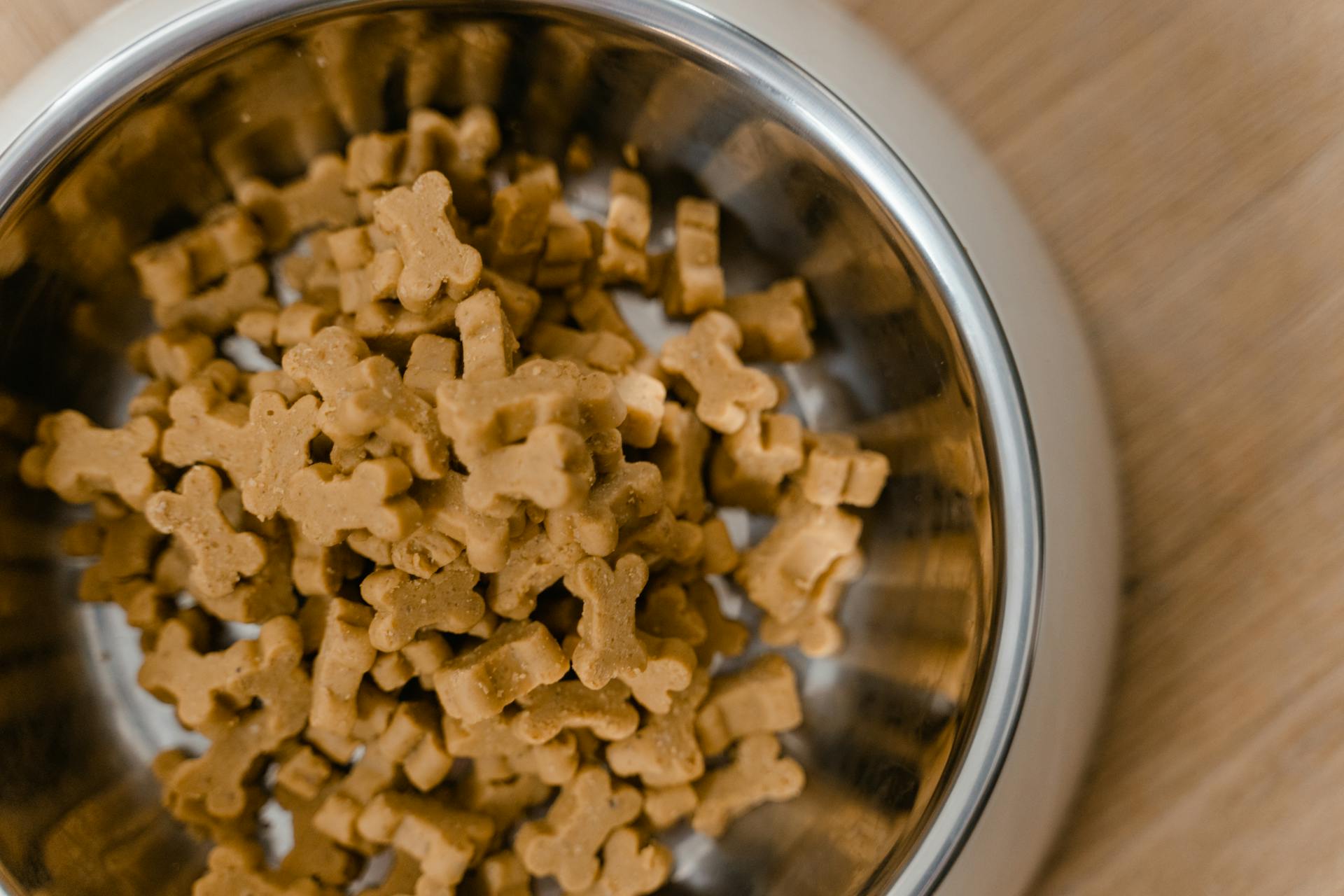
If your dog is experiencing an upset stomach, it's essential to provide them with the right food to help alleviate their discomfort. Boiled chicken can be a great option as it's easy to digest and can help firm up their stool.
To keep your dog hydrated, offer small amounts of water frequently throughout the day. A good rule of thumb is to provide water in small sips, every 10-15 minutes.
Some dogs may benefit from a bland diet of plain rice and boiled chicken, but it's crucial to consult with a veterinarian before making any changes to their diet. This combination can help soothe their stomach and promote healing.
In some cases, a small amount of canned pumpkin can also be added to your dog's meal to help regulate their digestive system and firm up their stool.
Check this out: Diy Raw Food Diet for Dogs
What Causes?
If your furry friend is experiencing an upset stomach, it's essential to understand what might be causing the issue. A sensitive stomach in dogs can be triggered by various factors, including food-related causes.
You might enjoy: Dog Stomach Noises
The protein source in your dog's food can be a culprit, as can the fiber source and fat content. Even the quality of ingredients can play a role.
Adequate vitamins and minerals are also crucial for a healthy digestive system. If your dog's food is lacking in these essential nutrients, it can lead to stomach troubles.
Here are some common food-related causes of sensitive stomachs in dogs:
- Protein source
- Fiber source
- Fat content
- Adequate vitamins and minerals
- Quality of ingredients
Keep in mind that if your dog is experiencing severe symptoms, it's critical to consult with your vet immediately.
Dietary Changes
If your dog's gastrointestinal issues have quieted down, it's best to reintroduce their normal food slowly to avoid returning symptoms. This means starting with small amounts and monitoring their progress before giving more.
A bland diet can be a lifesaver for dogs with upset stomachs, but it's essential to know how much to feed them. Offering small amounts frequently can help improve their symptoms, especially if you're only giving the bland diet for a week or two.
Intriguing read: Raw Food Diet for Dogs Calculator
Plain white rice is a great option for unwell, sensitive puppy stomachs, especially when combined with boiled chicken. Start with small portions and monitor their progress before giving more.
Canned pumpkin is a great source of fibre and various vitamins, making it an excellent addition to a bland diet. Just be sure to get the 100% pumpkin kind, not pumpkin pie filling, as those sugars can cause more issues.
If you're concerned about your dog's sensitive stomach, consider switching to a fresh diet. This may help alleviate ongoing digestive ailments, but be sure to introduce new foods slowly to avoid any adverse reactions.
A limited ingredient dog food that's complete and balanced is a good option if you need to continue a bland diet past a couple of weeks. This will ensure your dog is getting the calories, vitamins, and minerals they need to stay healthy.
Home Care and Remedies
If your dog has an upset stomach, it's essential to provide them with a gentle diet to help them recover. Small, frequent meals can be beneficial in settling their stomach, so offer your dog several small meals throughout the day, spaced a few hours apart.
Additional reading: Stomach Problems in German Shepherds
If they refuse food or vomit after eating, it's crucial to contact your vet. A bland diet such as cooked white rice and boiled chicken or white fish can speed up recovery. This diet should be used for a day or two, or you can buy a commercially made, nutritionally balanced bland food from your vet or a pet shop.
Plenty of water is also vital, so ensure your dog has access to water and monitor their drinking. If they stop drinking, vomit after drinking, or drink excessively, consult your vet. Rest is also essential, so let your dog rest and avoid vigorous activity until they recover.
Broaden your view: Can Dogs Get Diarrhea from Drinking Too Much Water
Home Care
If your dog has a mild upset stomach, there are some things you can try at home to help settle their stomach.
Small, frequent meals can be really helpful. Offer your dog several small meals throughout the day, spaced a few hours apart. If they refuse food or vomit after eating, contact your vet for advice.
For your interest: Merrick Dog Food for Small Dogs

A bland diet can be a lifesaver. Cooked white rice and boiled chicken or white fish are a great option for a day or two. You can also buy a commercially made, nutritionally balanced bland food from your vet, a pet shop, or online.
Make sure your dog has access to plenty of water and monitor their drinking. If they stop drinking, vomit after drinking, or drink excessively, consult your vet.
Rest is also important. Let your dog rest and avoid vigorous activity until they recover. If they have very low energy, contact your vet.
Once your dog is feeling better, you can gradually reintroduce their regular food over a few days, starting with a mix of half normal food and half bland diet.
Here are some additional remedies you can try:
- Bone broth: This can help whet your dog's appetite and encourage them to eat. You can make your own salt-free bone broth or use commercial broth made for pets.
- Oatmeal: Cooked oatmeal can be a soothing option for your dog's stomach. Just be sure to cook it in water and avoid adding any sweeteners or toppings.
- Canned pumpkin: This is a great source of fibre and can help bulk up your dog's stools if they have diarrhea. Just be sure to get the 100% pumpkin kind, not pumpkin pie filling.
Remember, if your dog doesn't improve quickly, worsens, or if you're concerned, contact your vet for advice.
When to Contact Your Vet
If your dog has a mild case of gastroenteritis, it's likely to improve within one to two days. However, there are some symptoms that warrant a vet visit.
Constant vomiting is a serious symptom that requires immediate attention. Very watery diarrhoea can also be a sign that your dog needs to see a vet.
If you notice blood in your dog's vomit or stool, it's time to contact a vet. Appearing unwell is another sign that your dog needs medical attention.
If your dog stops eating and/or drinking, it's a cause for concern and you should contact a vet. If their symptoms haven't improved within 24 hours, it's a good idea to schedule a vet visit.
Very young or old dogs may need more frequent vet visits, especially if they're experiencing symptoms of gastroenteritis. Dogs with underlying illnesses may also require more frequent vet visits.
Here are some symptoms that require a vet visit:
- Constant vomiting
- Very watery diarrhoea
- Blood in their vomit or stool
- Appears unwell
- Stops eating and/or drinking
- Doesn't improve within 24 hours
- Is very young or old
- Has another underlying illness
Nutritional Considerations
A complete and balanced diet is essential for your dog's overall health, and it's especially important when they have an upset stomach. This means choosing a dog food that states it's formulated to provide all the necessary nutrients for dogs.
Feeding your dog a homemade bland diet can be fine for temporary use, but it's not a long-term solution as it's not nutritionally balanced. If your dog needs a bland diet for an extended period, consider a limited ingredient dog food that meets AAFCO's standards for a complete and balanced diet.
Your veterinarian is a great resource to help you find a high-quality dog food that suits your dog's sensitive stomach. They can suggest brands, identify problematic ingredients, and provide nutritional information to look for in a dog food.
Identifying a Sensitive Child
Some children are more prone to mild intestinal upset, much like dogs with sensitive stomachs.
The term "sensitive stomach" is usually used to describe mild intestinal upset in dogs, and similarly, a sensitive child might experience mild digestive issues.

Children with sensitive stomachs may exhibit symptoms such as bloating, gas, or stomach discomfort after eating certain foods.
The symptoms of a sensitive child can be subtle, but they may include irritability, fatigue, or difficulty concentrating.
A sensitive child might also be more sensitive to certain environmental factors, such as noise or light.
In some cases, a sensitive child may experience mild intestinal upset, similar to a dog with a sensitive stomach.
Pancreatitis
Pancreatitis in dogs can be triggered by fatty or rich food, so it's best to avoid fatty food altogether while your dog is recovering.
This will give your dog's digestive system a break from working hard at emulsifying and breaking down fats.
Colitis
Colitis is a common issue that can cause a lot of discomfort for dogs. Many dogs are prone to colitis, and their sensitive guts can lead to diarrhea during times of stress or when they eat something out of the ordinary.
The best way to settle colitis is to feed a bland diet. A limited ingredient diet can also be effective in soothing the digestive system.
Increasing fiber can help to bulk up the stools and reduce painful straining and spasms. Pumpkin is a great source of fiber, and some companies have formulated complete & balanced limited ingredient recipes that contain pumpkin.
Here are some key signs to look out for if your dog has colitis:
- Excessive gas
- Diarrhea / soft stool
- Straining to poop
- Vomiting or regurgitation
Allergies
If your dog has a food allergy, they would benefit from a bland diet that contains limited ingredients. Food allergies can cause digestive symptoms like vomiting and diarrhea, but they can also cause skin rashes, itching, and swelling.
Since many allergens are proteins, it's most important to choose a diet with a single protein source. This can help minimize exposure to potential allergens and reduce the risk of an adverse reaction.
A single protein source can be a game-changer for dogs with food allergies, allowing them to thrive on a more straightforward diet.
Suggestion: What Are Dogs Allergic to in Dog Food
Finding High-Quality Digestion
When you're looking for a high-quality digestion dog food, it's essential to choose a complete and balanced diet that meets your pet's nutritional needs.
A good place to start is by consulting with your veterinarian or a veterinary nutritionist, as they can recommend specific brands and ingredients to look out for. They can also help you identify problematic ingredients and nutritional information to consider.
Some popular options for sensitive stomach dog foods include Purina Pro Plan Sensitive Skin & Stomach and Royal Canin Digestive Care.
If your dog has a sensitive stomach, you may want to consider adding fiber to their diet. Beet pulp, inulin, and psyllium are excellent sources of fiber that can help promote digestive health.
A fresh food diet made from lightly cooked, fresh meats and vegetables can also be highly digestible and may be a good option for dogs with sensitive stomachs.
Here are some signs of digestive problems to look out for:
- Excessive gas
- Diarrhea / soft stool
- Constipation
- Blood in stool
- Straining to poop
- Vomiting or regurgitation
- Pain and/or decreased mobility
- Bloating
- Excessive salivation
- Loss of appetite
If your dog's gastrointestinal issues have quieted down, it's essential to reintroduce their normal food slowly to prevent a recurrence of symptoms.
Feeding and Management
Once your dog's gastrointestinal issues have quieted down, it's essential to reintroduce their normal food slowly to prevent returning symptoms. Keep a close eye on their behavior and be prepared to switch to a new food if necessary.
Offering small amounts of bland diet frequently can help improve your dog's symptoms, especially if they're only needed for a week or two. A portion similar in size to their normal dog food is a good starting point, and you can adjust as needed.
It's also crucial to find a limited ingredient dog food that's complete & balanced if the bland diet is going to continue past a couple of weeks, ensuring your dog gets the necessary calories, vitamins, and minerals to stay healthy.
Homemade Meals
Feeding a dog with a sensitive stomach can be a challenge, but a fresh diet may help alleviate ongoing digestive issues.
A simple dinner of cooked chicken meat and boiled rice can help settle an upset stomach or calm diarrhea.
This type of meal can be made at home, but it's essential to ensure the meals meet all of your dog's nutritional needs.
Working with a veterinarian or a veterinary nutritionist is crucial to guarantee that the homemade meals are well-balanced and complete.
The website Balance IT, created by board-certified veterinary nutritionist Sean J. Delaney, DVM, MS, DACVN, is a helpful tool for both veterinarians and dog owners looking to create a homemade diet.
Offering small amounts of a bland diet frequently can help improve symptoms of a stomach upset.
A portion similar in size to your dog's normal dog food should be sufficient for a temporary bland diet lasting a week or two.
Their Diet Has Worked—Now What?
Now that your dog's stomach issues have quieted down, it's time to think about reintroducing their normal food. In fact, it's best to do this slowly to give their digestive system a chance to fully heal.

Their stomach may no longer be violently protesting, but they're still healing internally. So, be patient and don't rush things.
You can start by introducing small amounts of their old food into their meals, and then gradually increase the proportion over a few days. This will help prevent any sudden upsets.
If your dog takes well to their old food, it's possible they just hit a bump in their digestive road. You can help prevent future upsets by strengthening their gut system.
Including a probiotic into their meals can encourage a variety of gut flora to make them more resistant to funky bacteria they could encounter in their day-to-day life.
Frequently Asked Questions
Are scrambled eggs good for a dog's upset stomach?
Yes, plain scrambled eggs can be a gentle option for a dog's upset stomach, but be cautious of dairy sensitivities. For a soothing solution, try plain scrambled eggs or mashed potatoes instead.
Sources
- https://www.akc.org/expert-advice/nutrition/best-dog-food-sensitive-stomachs/
- https://www.pdsa.org.uk/pet-help-and-advice/pet-health-hub/conditions/gastroenteritis-stomach-upset-in-dogs
- https://www.thefarmersdog.com/digest/best-dog-food-sensitive-stomach/
- https://www.reddogbluekat.com/post/vet-recommended-meals-for-your-dogs-upset-stomach
- https://www.raisedrightpets.com/blog/bland-diet-for-dogs/
Featured Images: pexels.com


